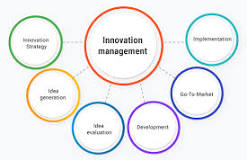The Importance of a Strong Business Development Strategy
In today’s competitive business landscape, having a well-defined business development strategy is crucial for sustained growth and success. A robust strategy not only helps businesses identify new opportunities but also enables them to navigate challenges effectively.
Key Elements of a Successful Business Development Strategy
Market Research: Understanding the market landscape, customer needs, and industry trends is essential for developing a successful strategy. Conducting thorough research allows businesses to identify gaps in the market and tailor their offerings accordingly.
Relationship Building: Building strong relationships with customers, partners, and stakeholders is key to driving business growth. By fostering trust and loyalty, businesses can create long-lasting connections that lead to repeat business and referrals.
Innovation: Embracing innovation and staying ahead of the curve is vital for remaining competitive in today’s fast-paced environment. Businesses that continuously innovate their products, services, and processes are more likely to attract new customers and retain existing ones.
Implementing a Business Development Strategy
Set Clear Goals: Define specific, measurable objectives that align with your overall business goals. These goals will guide your strategy and help you track progress towards achieving them.
Allocate Resources Wisely: Invest resources strategically in areas that will have the most significant impact on your business development efforts. This may include hiring skilled professionals, implementing new technologies, or expanding into new markets.
Monitor Performance: Regularly monitor and evaluate the performance of your business development initiatives against predefined metrics. Adjust your strategy as needed based on feedback and insights gained from monitoring activities.
The Bottom Line
A well-crafted business development strategy is essential for driving growth, expanding market reach, and staying ahead of the competition. By focusing on market research, relationship building, innovation, goal setting, resource allocation, and performance monitoring, businesses can create a roadmap for success in today’s dynamic business environment.
Key Insights into Crafting an Effective Business Development Strategy: Answering Eight Common Questions
- What is a business development strategy?
- Why is a business development strategy important for businesses?
- How can market research help in developing a business development strategy?
- What role does relationship building play in a business development strategy?
- Why is innovation crucial in a business development strategy?
- How can businesses set clear goals for their business development strategy?
- What are the key resources that businesses need to allocate for effective business development?
- Why is monitoring performance essential in evaluating a business development strategy?
What is a business development strategy?
A business development strategy refers to a comprehensive plan of action designed to identify and seize opportunities for growth within a business. It involves analysing market trends, assessing customer needs, and leveraging relationships to drive expansion and profitability. A well-defined business development strategy outlines clear objectives, sets priorities, and determines the resources needed to achieve desired outcomes. By implementing a strategic approach that aligns with the company’s goals and values, businesses can enhance their competitive edge, foster innovation, and establish sustainable growth in today’s dynamic marketplace.
Why is a business development strategy important for businesses?
A business development strategy is crucial for businesses as it serves as a roadmap for growth and success in an increasingly competitive market. By outlining clear objectives, identifying new opportunities, and leveraging strengths to overcome challenges, a well-defined strategy enables businesses to stay agile and adaptable in response to changing market dynamics. It helps businesses align their resources effectively, foster innovation, build strong relationships with customers and partners, and ultimately drive sustainable growth. Without a solid business development strategy in place, businesses may struggle to navigate uncertainties, miss out on potential opportunities for expansion, and risk falling behind competitors.
How can market research help in developing a business development strategy?
Market research plays a pivotal role in shaping a robust business development strategy by providing valuable insights into the market landscape, customer preferences, and industry trends. By conducting thorough market research, businesses can identify untapped opportunities, understand their target audience’s needs and preferences, and assess the competitive landscape. This information enables companies to make informed decisions when developing their business development strategies, helping them tailor their products or services to meet customer demands effectively and gain a competitive edge in the market. Ultimately, market research acts as a guiding light for businesses looking to formulate successful strategies that align with market dynamics and drive sustainable growth.
What role does relationship building play in a business development strategy?
Relationship building plays a pivotal role in a business development strategy as it forms the foundation for long-term success and growth. By nurturing strong relationships with customers, partners, and stakeholders, businesses can establish trust, credibility, and loyalty. These relationships not only lead to repeat business and referrals but also provide valuable insights into customer needs and market trends. Effective relationship building fosters collaboration, opens doors to new opportunities, and enhances the overall reputation of the business. In essence, prioritising relationship building in a business development strategy is key to establishing sustainable connections that drive business growth and success.
Why is innovation crucial in a business development strategy?
Innovation plays a crucial role in a business development strategy as it drives growth, fosters competitiveness, and enhances adaptability in today’s rapidly evolving business landscape. By embracing innovation, businesses can differentiate themselves from competitors, attract new customers, and retain existing ones. Innovative solutions and approaches allow companies to stay ahead of market trends, anticipate changing customer needs, and seize new opportunities for expansion. Moreover, innovation sparks creativity within the organisation, motivating employees to think outside the box and explore novel ways to improve products, services, and processes. Ultimately, integrating innovation into a business development strategy is key to achieving long-term success and sustainability in an increasingly dynamic market environment.
How can businesses set clear goals for their business development strategy?
Setting clear goals for a business development strategy is essential for guiding the direction and focus of a company’s growth efforts. Businesses can establish clear goals by first aligning them with their overall vision and mission. These goals should be specific, measurable, achievable, relevant, and time-bound (SMART). By conducting a thorough assessment of current market conditions, customer needs, and internal capabilities, businesses can identify areas for improvement and growth. Regularly reviewing and adjusting these goals based on performance metrics and market feedback ensures that the business development strategy remains agile and responsive to changing circumstances. Clear communication of these goals to all stakeholders within the organisation fosters alignment and commitment towards achieving them.
What are the key resources that businesses need to allocate for effective business development?
When considering effective business development, it is crucial for businesses to allocate key resources strategically. These resources may include financial investments to fund marketing campaigns, hiring skilled professionals to drive sales and partnerships, implementing advanced technologies for data analysis and automation, and dedicating time and effort towards building strong relationships with customers and stakeholders. By allocating resources wisely across these areas, businesses can enhance their business development efforts and maximise their growth potential in a competitive market landscape.
Why is monitoring performance essential in evaluating a business development strategy?
Monitoring performance is essential in evaluating a business development strategy because it provides valuable insights into the effectiveness of the strategy and its impact on overall business growth. By tracking key performance indicators (KPIs) and metrics, businesses can assess whether their strategic initiatives are meeting objectives and delivering desired results. Monitoring allows for timely adjustments to be made, identifying areas of improvement or potential challenges early on. This data-driven approach not only helps in making informed decisions but also ensures that resources are allocated efficiently to drive continuous improvement and success in the competitive business landscape.






